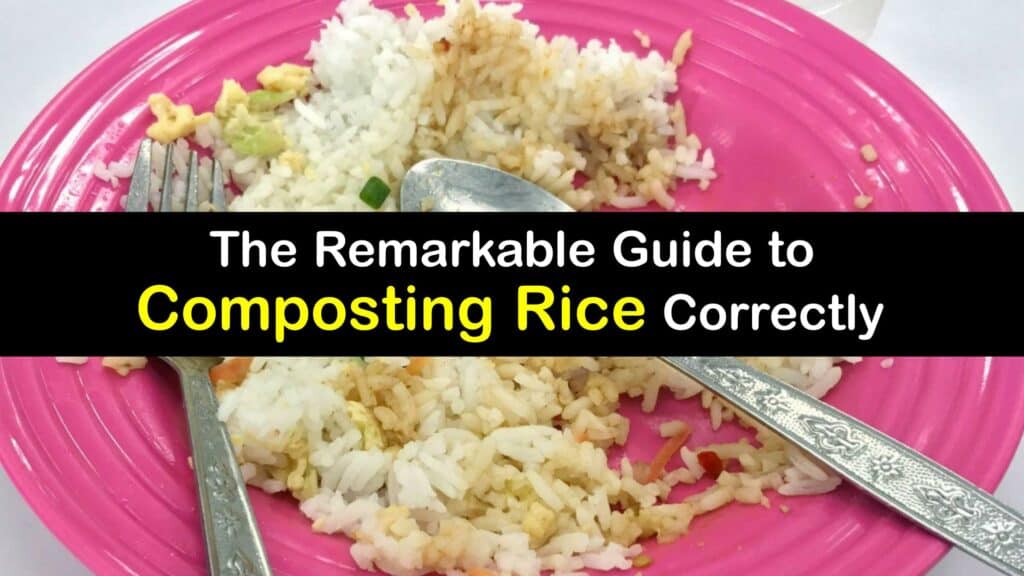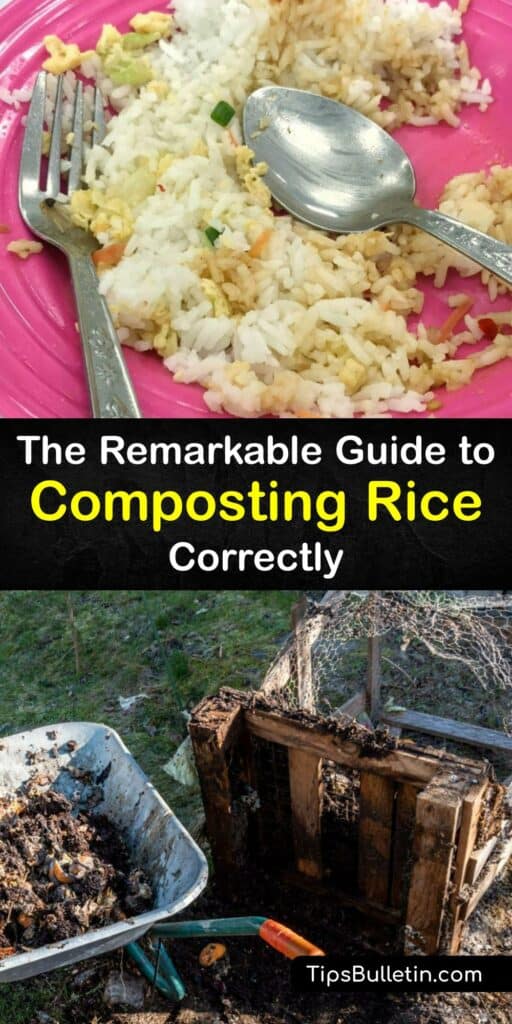Can you compost rice? A typical side dish served with practically any dinner, rice is starchy and delicious. Although rice is a prominent food in numerous cultures, its compatibility with compost bins is still relatively unknown. Composting rice is fine, provided suitable methods are employed. Including rice in your composter incorrectly could slow or even stop decomposition.
Knowing what is safe to compost might be challenging at times. Adding rice to a covered bin or a hot composter is better to hasten the decomposition. Both cooked and uncooked rice are compostable yet should only be used in small amounts to avoid attracting vermin and other pests.
Refrain from throwing rice carelessly onto your compost pile. The goal of every composter is to create an abundance of high-quality organic finished compost. To find out exactly what to do with your leftover rice, read our comprehensive advice on how to compost rice and get the most from your compost pile.

All About Composting Rice
Whether you have a composter or are interested in starting one, you have probably wondered, “Can you compost rice?” Rice is a staple in several tasty cuisines and offers a great way to feed a family affordably. From burritos to curries and fried rice, rice is well-loved across North America.
With so many people eating this staple, it’s no surprise there is some waste. Find out the best way to start composting in your kitchen and convert your leftover rice into rich organic fertilizer for your plants rather than sending it to a landfill.
Although there’s some debate about the efficacy of composting rice, it’s manageable with the proper protocols and knowledge. Discover how to compost rice, what methods to use, mistakes to avoid, and the benefits of using rice compost on your indoor, container, and garden plants.
You can also make use of other rice waste, such as the water used to wash rice. Use leftover rice water for your house plants to boost the nutrients.
What Is Composting?
A composter converts organic material, including food scraps, into usable compost. Microorganisms facilitate the breakdown of natural materials into a soil-like fertilizer called finished compost.

Transfer organic waste into a compost pile or bin built to provide the best conditions for decomposition. Be sure to follow a list of things that can be composted. Nitrogen-rich green material and brown, carbon-rich material make up the two categories of organic material in a composter.
Uphold certain conditions to aid the bacteria’s task of turning waste materials into beneficial organic fertilizers for the garden. For the quickest degradation, use a 1:3 blend of greens and browns. Ensure the compost pile is kept damp and rotated periodically for aeration.
Compostable Materials
Compostable materials classified as green are nitrogen-rich. Nitrogen enables bacteria and other beneficial compost microbes to multiply and proliferate by giving them a quick source of nutrition.
Grass clippings and food scraps like coffee grounds, vegetable scraps, and banana peels are examples of green organic matter. Rice is in the middle of the spectrum of green and brown composting components. Cooked rice is greener as it’s a moist food scrap.
Uncooked rice or pasta takes longer to break down because it lacks moisture. Rice doesn’t have as much nitrogen as other kitchen waste, but it also doesn’t have as much carbon as brown material such as newspaper or a paper towel.
Microorganisms in a compost pile use carbon as an energy source. These substances degrade more slowly. Cardboard, twigs, and yard waste, such as dried leaves, are a few examples of brown materials.
Can You Compost Rice?
Can rice be composted? As with dairy products, meat, and other organic wastes, there’s some debate over composting rice. Since it’s an organic material, it is possible to compost cooked rice and uncooked rice, including the rice hull, in specific circumstances.
If rice is gradually introduced to compost piles, both cooked and uncooked will decompose. A pile of excess rice draws bugs, rats, and dangerous pathogens if added all at once.
One of the main reasons people try to avoid composting rice is harmful microorganisms. Certain types of bacteria cause the compost to flourish, but some potential bacteria developing on cooked rice are undesirable.
If rice fails to decompose appropriately, it smells terrible, draws pests, and maybe spreads plant diseases. Provided the proper precautions are taken, rice is suitable for composting.
Methods of Composting Rice
Organic material is converted into fertilizer naturally through composting. There are various techniques for composting. Before including rice, learn how to begin the composting process.
Most families decide which to try on the waste they anticipate producing and the available space for composting. Though cold composting is an option, hot composting is appropriate for rice.
A compost heap is relatively easy to set up and is perfect for producing large amounts of compost, but it needs a lot of outdoor space. Bins and tumblers provide a neater appearance and are self-contained. If you intend to buy a bin or tumbler, pick one that matches your preferences for size and aesthetics.
A vermicomposter uses worms to speed up the composting process. A worm farm is generally employed for smaller indoor projects. Its extraordinary capacity to decompose biodegradable material composts waste quickly.
How to Compost Rice
There are a few points to consider for the best results when including rice in compost. People who compost rice need to be very careful to ensure it doesn’t contain any materials that shouldn’t be composted, such as the excess grease in fried rice.
Like other compostables, rice decomposes best when separated into small pieces rather than adding an entire plate. Break up large quantities into smaller portions to mix in gradually. If your rice is in a plastic bag, do not include this in your composter, as it won’t break down.
Spread your raw or cooked rice into the composter after digging down a few layers, then cover it back up. By burying the rice, garden pests are less likely to be attracted to the aroma of the food, and the fresh material is in a warmer area of the compost system.
Turning Rice in Compost
One of the primary issues with rice in compost is that if it takes too long to decompose, it becomes clumpy and sticky, obstructs the airflow, and attracts unwanted bugs. Turning your compost frequently is the secret to solving many of these issues.
Regular turning is crucial for any compost, but it becomes more critical when you compost something challenging, such as rice.
Composting ingredients like rice decompose faster if you frequently turn your compost. Grab a pitchfork or spade and flip over several layers of the compost to create air spaces. Turn your compost heap or rotate your tumbler at least once every two weeks.
Common Rice Composting Mistakes
You’ll probably draw pests to your composter if it contains layers of stale leftover rice. Avoid significant composting errors to prevent this from happening. It’s advisable to add rice to your compost heap slowly.
Leftover food won’t correctly break down if too much cooked or uncooked rice clumps together. A compost mound in your backyard should only include plain rice. Butter, oils, fat, and seasonings, frequently included in fried rice, draw insects and cause unpleasant odors.
If the compost doesn’t decompose after two weeks, add extra nitrogen- or carbon-based components. Starch makes up the majority of white rice and takes a lengthy period to decompose. Hasten the process by including carbon-based items like paper or dried leaves.
Combining the rice and these items is advisable before adding them to the compost pile. It’s necessary to add nitrogen-rich elements as well as carbon-based ones, such as coffee grounds and vegetable peel.
Benefits of Rice Compost
Is rice good for compost? Though we consider it a waste product, leftover rice is a valuable source of essential nutrition for finished compost. The nitrogen in rice is crucial to keep your compost decomposing and an essential mineral utilized by plants and food crops to flourish.
Rice and the other organic waste on your pile bestow nutrients into the compost, providing your plants with the nourishment they require to produce abundant fruit and blossoms, stay healthy, and be resistant to pests and diseases.
Using rice as a compost material reduces food waste by keeping it out of landfills. Turn a foodstuff you don’t need into valuable finished compost to feed your interior and outdoor plants.
Get limitless, cost-free, high-quality organic fertilizer from a composter. Compost is an incredible soil amendment to improve soil structure, encourage leaf growth, or act as a mulch,
Composting rice and other cooked food is appropriate for cold and hot compost piles. After checking out this article, do you better understand the ins and outs of including rice in your composter? Compost your unused rice to reduce your environmental footprint and enjoy free plant food for your garden.

If you loved this illuminating article discussing “Can you compost rice?” please share it with your friends and family curious about how to compost rice on Pinterest and Facebook.